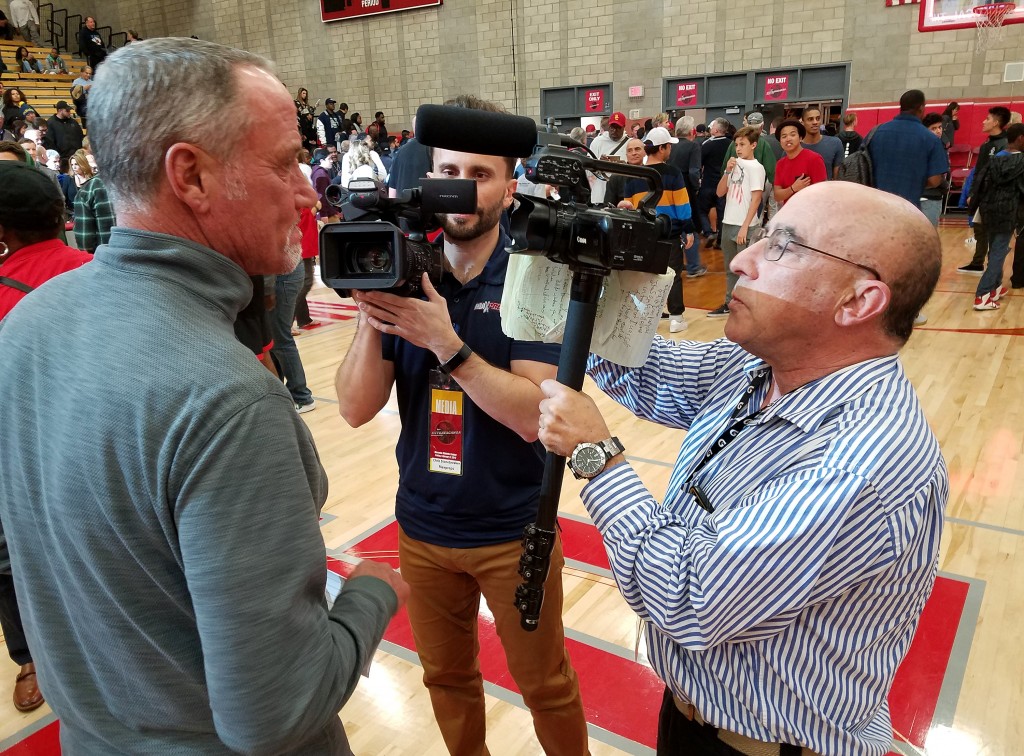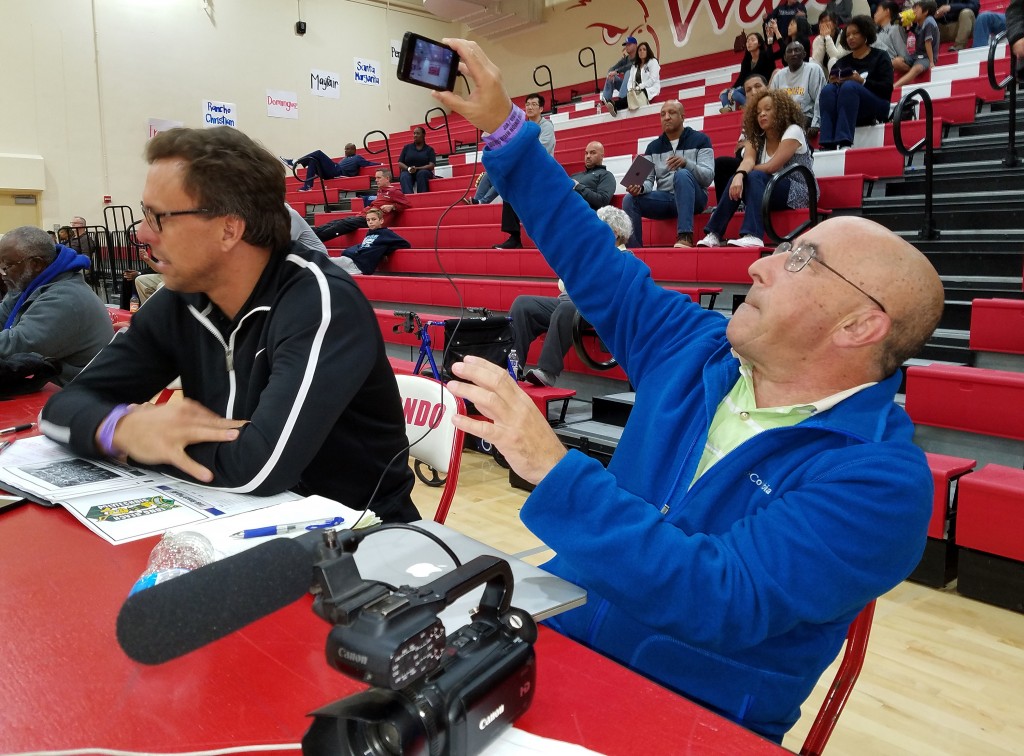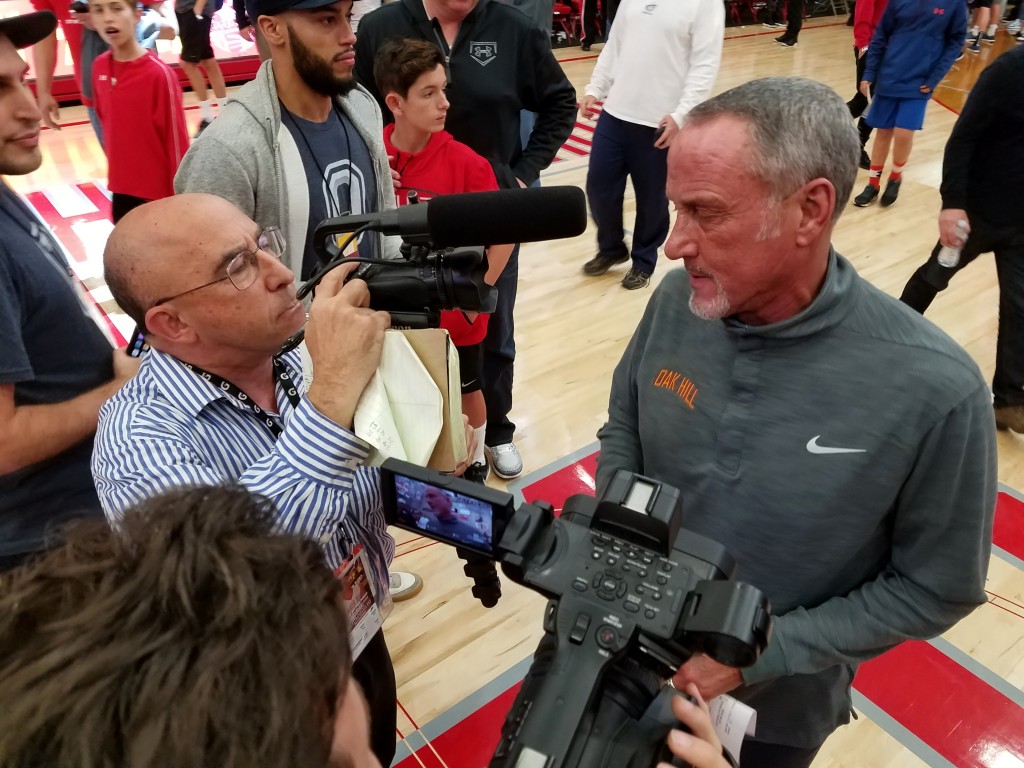It was 1976 when sportswriter Eric Sondheimer graduated from John H. Francis Polytechnic High School in Los Angeles, the same year that future Hall of Famer John Elway moved with his family from Washington to sunny Southern California.
Elway’s father, Jack Elway, scored a head coaching job at the California State University Northridge, the same school where Sondheimer was about to pursue a degree in journalism. By mere happenstance, Sondheimer started working as a stringer for the Daily News in the San Fernando Valley, just ten miles from John Elway’s new high school, Granada Hills.

It was there that Sondheimer, an 18-year-old freelancer at the start of his career, first got to see Elway play football. A sophomore in high school just a few years younger than Sondheimer, Elway was just starting to get attention from college recruiters and local newspapers.
The two men shared the same humble beginnings, under the Friday night lights of the Valley preps scene. For Sondheimer, the experience of covering Elway was enough to have him hooked for life.
“He was probably the best football player I’ve ever seen. It raised the expectations for many years,” Sondheimer said.
While many aspiring sports journalists will spend only a handful of years covering high school sports, cutting their teeth on preps before moving onto the big leagues, Sondheimer is different. The 58-year-old Los Angeles native has spent more than forty years covering high school sports, and he doesn’t plan on quitting anytime soon.
“Now if I do it for fifty years that will be unusual,” laughed Sondheimer, who started fulltime for the Daily News in 1980 as a prep editor and who has been with the Los Angeles Times since 1997.
Sondheimer’s passion for sportswriting can be traced to the day in junior high when he was cut from his school’s basketball team. The only way for Sondheimer to stay involved, he said, was to become a writer for the school newspaper. “I learned that I had a lot more influence as a writer than I did playing,” Sondheimer said.
Sondheimer has certainly yielded influence as a writer. Over the years, he’s covered greats like Jason and Jarron Collins, Kawhi Leonard, and James Harden, he’s won awards for exposing recruiting violations that caused universities to go on probation and he’s held coaches and parents accountable.
“He’s a no-nonsense guy. He has a good relationship with the coaches, he knows the game, and they can’t pull anything over on him,” said Gary Washburn, a national basketball writer for the Boston Globe, who previously worked under Sondheimer at the Daily News.
A noticeably impressive work ethic, one that stands out to his colleagues, helped earn Sondheimer a job at the Times.
In the nineties, when the Times printed regional editions, Sondheimer’s current editor, Mike Hiserman, who was working as the sports editor for the San Fernando Valley and Ventura editions, needed to hire a deputy editor. He set up a meeting with a man named Mike Anastasi, then-editor of the Daily News, thinking he’d be great for the job.
Things were looking good for Anastasi, until partway through the lunch, when Anastasi couldn’t stop talking about one of his own columnists, a reporter by the name of Eric Sondheimer. Anastasi told Hiserman that Sondheimer’s work was so popular that readers would actually complain when his articles weren’t on the cover of the paper’s regional edition.
Hiserman offered the job to Sondheimer, who gladly accepted. The Times was so excited to nab the popular local sportswriter that they ran an ad on the side of a metro bus with a massive picture of a smiling Sondheimer on it.
“Over the years, I like to think I’ve made a lot of good hires,” Hiserman said, “but that hire was, I don’t think there’s any question, one of the most impactful hires I’ve ever made.”
Bill Plaschke, a sports columnist at the Times who has been Sondheimer’s co-worker for nearly 20 years, credits the Times’ strong reputation for sports coverage, in part, to Sondheimer building a solid foundation with sources and readers.

“If you dug down there and looked at that foundation, the name written in concrete would be ‘Eric Sondheimer,’” Plaschke said. “Every great athlete that comes out of LA, chances are he’s the first journalist that they ever spoke to.”
It’s true that Sondheimer isn’t somebody players quickly forget. While Plaschke was covering the 2006 World Series, he recalled gathering with other sportswriters for an off-day interview with St. Louis Cardinals pitcher Jeff Suppan, who grew up in Los Angeles.
“All around were the greatest sportswriters in the country: Gods, legends, Hall of Famers,” Plaschke remembered. One reporter asked Suppan to name the greatest American sportswriter. Suppan looked up at all of the journalists and without blinking, said, “No question, it’s Eric Sondheimer.”
Ramona Shelburne, an NBA insider and senior writer for ESPN, who was a three-time Academic All-American softball player while at Stanford University, met Sondheimer while she was in high school at El Camino Real in Los Angeles.
“It was such a big deal to be in Eric Sondheimer’s column,” Shelburne said. “If Eric Sondheimer mentioned your name, it was like, ‘Oh my God, I’ve made it.’”
Jarron Collins, former NBA player and current assistant coach for the Warriors, recalled a similar feeling of pride during his high school days at Harvard-Westlake. When Sondheimer wrote about him and his twin brother, Jason, Collins’ parents ran out to a grocery store to purchase every copy of the newspaper with Sondheimer’s article in it.
“Seeing him at the gym during a high school game or whatnot, you knew it was a big game,” Collins said, “and that you were going to get your name written up.”
Among his peers at the Times, Sondheimer is known for his tireless work ethic, his distinctively-Sondheimer voice, and his unparalleled depth of knowledge of the Southern California sports scene.
“He can make one phone call and people will tell him anything. They trust him. Everybody knows him. Coaches grew up reading him,” Plaschke said.
During football season, Sondheimer gets to the newsroom in downtown Los Angeles by 5:30 a.m., he calls coaches, replies to emails, writes his blog and even edits videos, a skill he taught himself partway into his career. He works seven days a week, so that he’s always available if a source calls him. He says he likes to plan ahead, drafting his sports columns days before they’re due to publish.
Sondheimer: “Back when I got hired in 1997, I was just a columnist, but now I multi-task. I take video, photos. I tweet. I do blogs. I cover game stories. I write a column. I go on TV. I go on radio. It is an amazing change that has happened and I embrace that.”
On Twitter, Sondheimer boasts more than 66,000 followers.
Unlike sports journalists who cover a professional team, Sondheimer covers the Times’ entire circulation area, including more than 700 high schools in Los Angeles. There are no public relations people in high school sports, so when Sondheimer wants to keep track of statistics during a game, he keeps them himself, meticulously recording results on a sheet of paper.
“I don’t know when he sleeps,” said Hiserman, “he works constantly.”

Hiserman joked about Sondheimer’s messy desk. “He’s organized, but he’s one of those people where when you look at his desk it looks like a bomb went off. But, if you ask him for something, he’ll reach into a pile of rubble and pull out a sheet of paper that’s exactly what you asked for.”
Sondheimer is described by his co-workers as a good listener, as diligent, as principled. On occasion he’s been known to raise his voice over the phone at coaches, according to Plashcke.
“He wants to shine a light on stuff that’s going on that he thinks should be exposed and so he does,” Hiserman said, “Some people don’t like it. And Eric’s fine with that.”
Sondheimer believes in high school sports the way that he believes in the value of a good story, a great kick or a coach that changes a player’s life. Even when he gets frustrated, by the proliferation of transfers, by college recruiters who don’t follow through on their promises to players or by the creation of super-teams that recruit student-athletes from all around the state, he still loves his job.
Sondheimer: “I didn’t want to write about Kobe Bryant 82 games a year. That seems boring to me. But if you get to write about people who are different, each story is different.”
Mike Hiserman puts it best: “If he’s not one of a kind, then he’s one in a million. I mean that. I don’t know anyone like him.”
CORRECTION – Editor’s Note (4/27/2017): This story is updated to state that Bill Plaschke has been Sondheimer’s co-worker for nearly 20 years.
